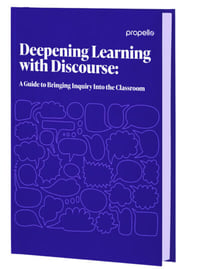Deepening Learning with Discourse

Get Your Free Copy
What's Inside
Chapter 1: An Introduction to Academic Discourse and Accountable Talk
What is discourse-driven instruction and why does it matter?
Chapter 2: The Relationship between Accountable Talk and Discourse
How do they work together in creating an open learning environment for students?
Chapter 3: Understanding the Importance of Discourse in Education
How does discourse promote cognitive development and critical thinking?
Chapter 4: Diving into the Impacts of Discourse in the Classroom
What role does discourse have in improving student outcomes and deepening learning?
Chapter 5: 10 Tips for Implementing Accountable Talk and Discourse in Your Schools
Effective takeaways that you can use to introduce this approach to your school.
Chapter 6: Next Steps and Resources
Additional resources including free printables that you can use to introduce discourse to your instruction.
“Everything about activating a child’s cognitive skills begins with activating their social connectedness. Verbalizing, using language, and working with peers creates the kind of social stimulus that drives the biochemical processes that develop the learning centers of the brain.”

Pamela Cantor, M.D.
Child and Adolescent Psychiatrist
Author
“Children are hard-wired to talk - we know as teachers from the amount of time we spend settling classes down to ‘listen’. But when we tap into children’s predisposition to discuss what is in their heads, we can make magic happen. It is often said that if you can explain your learning to someone else then you truly understand it, and purposeful classroom discourse enables children to explore and build on their thinking through talk. Academic talk should be developed right from the earliest years, for example, by setting up ‘talk partners’; paired work where children can discuss learning without waiting, so maximising the amount of discourse going on at any one time. The skills of discourse can then be built on over the years so that by the end of formal schooling students can respectfully debate, counter-argue, and develop ideas in a way that prepares them for higher education, and eventually, the world of work.”

Jo Tillson
VP of Content and Curriculum, Propello
Former Educator
“We all know our youngest learners want to raise their hands and participate in class. This is prime opportunity to begin teaching the difference between ‘contributing’ and ‘discourse.’ Discourse requires a student to listen to their classmates and to be able to respond. That’s really hard for a little one who has a story to tell. But we can start small by having little learners put their hands down when someone is speaking. Listen first. Acknowledge what the speaker said, and then add on. Even kinders can follow these steps with prompts. Imagine the discussions those same learners will have by the time they are in middle and high school!”

Lisa Thayne
Lead Editorial Program Manager, Science, Propello
Former Educator
“Discourse and Accountable Talk go hand-inhand. In the classroom, one facilitates the other, allowing the teacher to monitor student understanding and application of the topic in real-time, while also building student collaborative and critical thinking skills.”

Julie Waid, Ed.D.
Product Marketing Manager, Propello
Former Educator
“Building a culture of psychological safety in a classroom is key to engaging students in meaningful discourse. Otherwise, they tend to tell you what they think you want to hear. Teachers need to model acceptance of and curiosity about students’ ideas and questions. We must also recognize our mistakes and apologize to the students if we fall short of our own expectations. This vulnerability and modeling are part of building the culture.”

Katherine Hovanec, M.Ed.
Cross Curricular Instructional Specialist, Propello
Former Educator
How Propello helps every district, school, and student soar.
Propello is thoughtfully designed by educators, for educators.
Hands-On, Active Learning
Inquiry, phenomena, and project-based learning that sparks engagement and accelerates student outcomes.
Meet Every Student's Learning Needs
Embedded supports, translations and scaffolding improve classroom accessibility and equity.
Customized & Flexible Lesson Planning
Monitor Student Progress
Built-in formative and summative assessment options with real-time data reporting.
